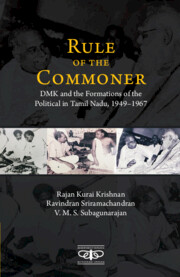2 - The Uses of Language
Published online by Cambridge University Press: 15 June 2022
Summary
There is a race known as Tamilian
They do possess a singular character
Their ways are sweet as nectar
Love is the language they speak
—Namakkal Ramalingam (poet, congressman andIndian nationalist)The political rise of the Dravida Munnetra Kazhagam(DMK) was intimately connected to the use of theTamil language, the recovery and circulation of itsliterary corpus of the last two millennia, and acelebration of Tamil difference, its past, itscivilization, and its glory. However, officially,and for all intents and purposes, the DMK aspired towork for an independent federation of the southIndian states speaking four languages, to be calledDravida Nadu. This was the only form of secession itarticulated from 1949 to 1963. It never demanded thesecession of the state of Tamil Nadu alone. Hence,whether one likes it or not, the DMK was not a Tamilnationalist party. This disambiguation is necessaryif we are to understand how exactly the relationshipbetween Tamil, as a signifier that can stand for notonly the language but also a people and a land, andthe politics of the DMK are intimately connected. Itwill be rewarding to begin with a text that bestbetokens the ambiguity surrounding this issue.
Sumathi Ramaswamy's Passions ofthe Tongue (hereafter PoT) opens with the dramaticscene of Chinnasamy, a well-known martyr for theTamil cause and a DMK cadre, walking out of hishouse early in the morning on January 25, 1964, witha fuel can in his hand to douse and set himself onfire. His death cry “Inti oḻika! Tamiḻ vāḻka!”(Death to Hindi! May Tamil flourish!), launches thetrain of reflection for the book. In other words, ina semiotic sense, Chinnasamy's self-immolationprovides the token for the whole enquiry; assumingthat he belonged to the type called Tamil devotee,the enquiry turns out to be about the passioninvoked by language. The book PoT is a history of Tamiḻ paṟṟu, a composite of terms“Tamiḻ” and “paṟṟu”—the latter standing forattachment or allegiance—the act of holding on tosomething, which PoTglosses as Tamil-language devotion.
- Type
- Chapter
- Information
- Rule of the CommonerDMK and Formations of the Political in Tamil Nadu, 1949–1967, pp. 40 - 62Publisher: Cambridge University PressPrint publication year: 2022



